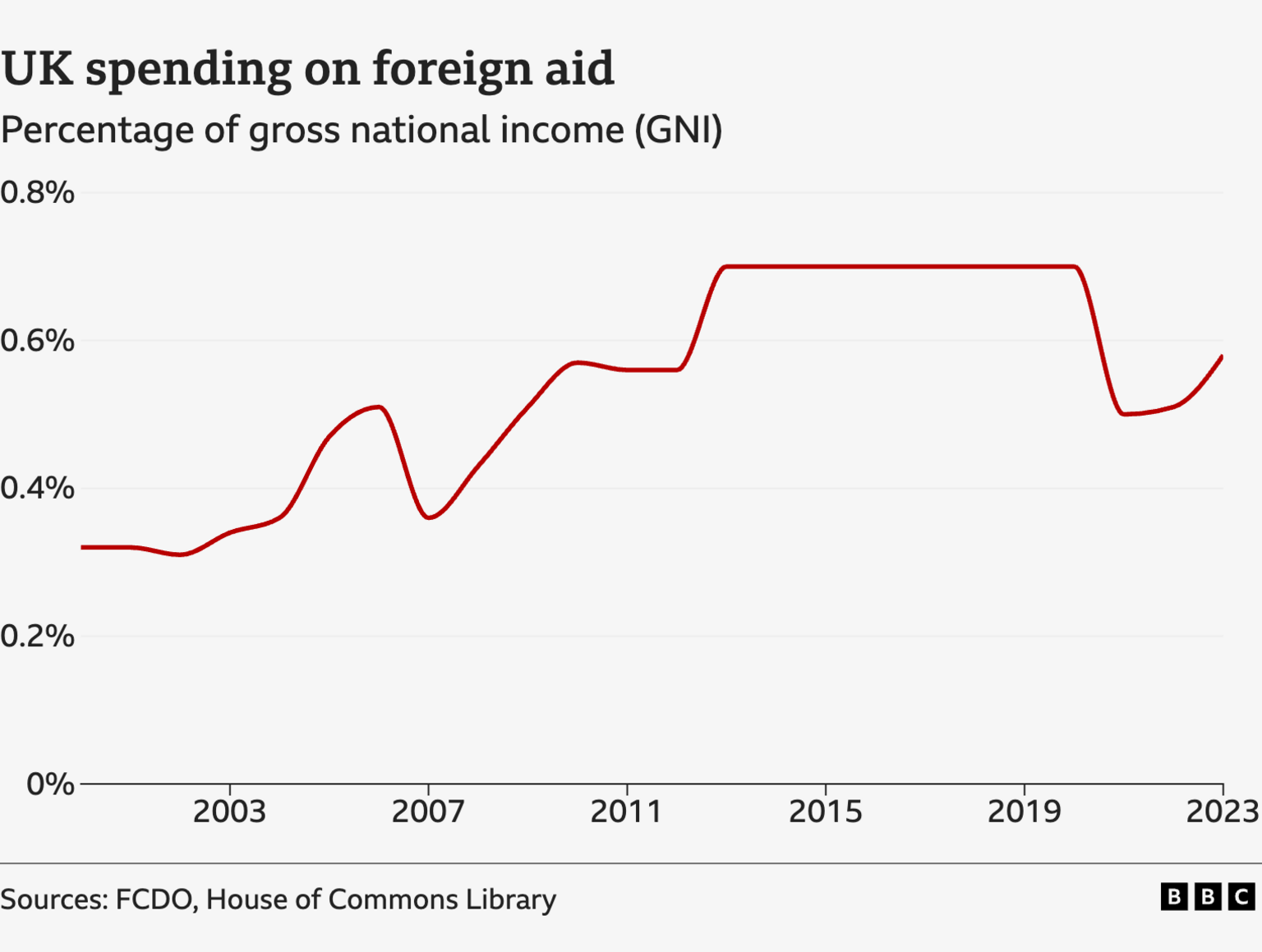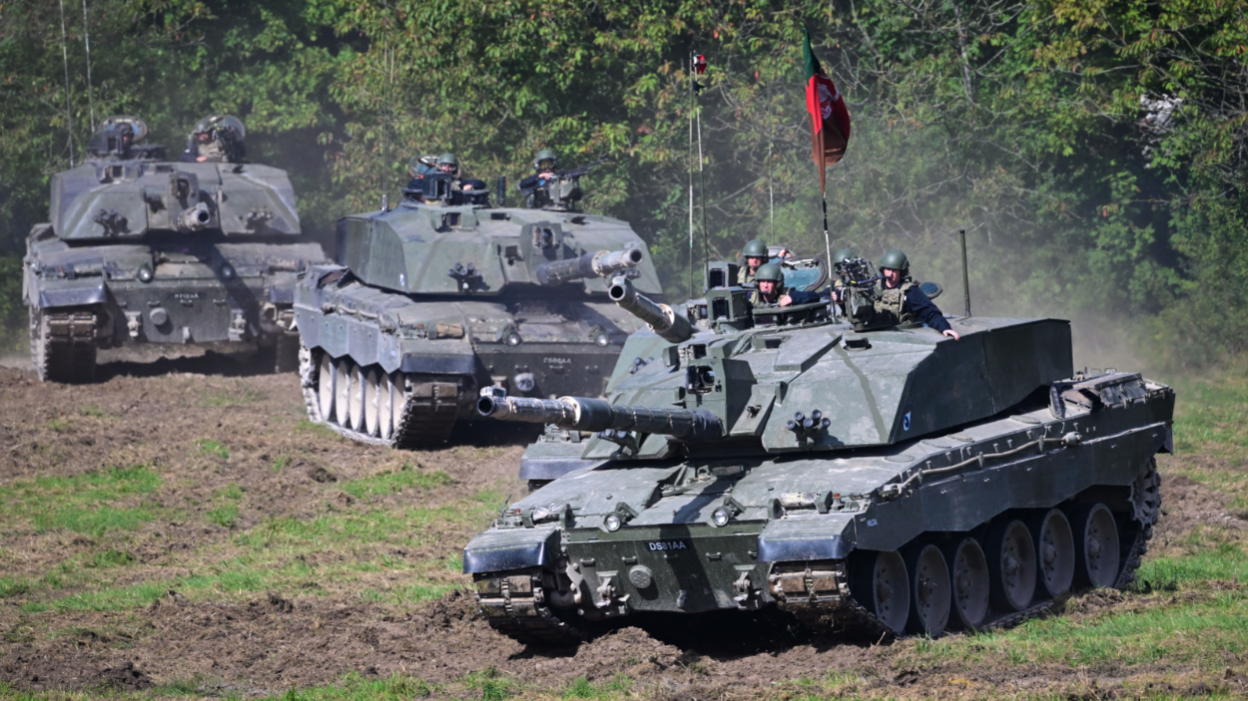Starmer cuts aid to fund increase in defence spending
A 'dangerous new era': Starmer explains decision to boost defence and cut aid
- Published
Sir Keir Starmer has set out plans to increase defence spending to 2.5% of national income by 2027.
The prime minister said he would cut the foreign aid budget to fund the military boost - a move welcomed by the US administration but labelled a "betrayal" by development charities.
Sir Keir will face MPs in the Commons on Wednesday before flying to the US, where Ukraine will be top of the agenda in a meeting with President Donald Trump.
The spending announcement came as leaders across Europe looked to overhaul defence policies over fears the US could make a deal with Russia to end the Ukraine war which leaves the continent vulnerable.
Trump - who has long called for European members of the Nato military alliance to spend more on defence - is attempting to cut a rapid deal to bring the Ukraine war to an end after speaking to Russian President Vladimir Putin.
He has been a staunch critic of the previous US administration's military support for Kyiv and wants Europe to play a bigger role in any future security guarantees for Ukraine.
On Tuesday, Ukrainian officials confirmed to BBC News a deal had been reached which gives American firms access to the country's vast deposits of valuable rare earth minerals, which Trump signalled could mean continued US military support for Kyiv until a ceasefire with Russia is reached.
Announcing the defence spending plan, Sir Keir said the UK's aid budget would be reduced from 0.5% of gross national income to 0.3% in 2027, "fully funding the investment in defence", which will rise from 2.3% of GDP.
He told the Commons that would mean spending £13.4bn more on defence every year from 2027.
Last year the UK spent £53.9bn on defence.
The prime minister said defence spending would rise to 2.6% of GDP by 2027, once the contribution of intelligence services to defence had been factored in.
The move was praised by US Defence Secretary Pete Hegseth, who called it a "strong step from an enduring partner".
Urging European allies to step up, Sir Keir said the UK would also set out a "clear ambition" to increase defence spending to 3% of GDP after the next general election.
Holding a news conference following the announcement, Sir Keir said an election pledge to raise defence spending to 2.5% of GDP had been brought forward "in light of the grave threats that we face", with the country facing a "dangerous new era".
Asked if pressure from Trump had pushed him to act, Sir Keir insisted it was "very much my decision, based on my assessment of the circumstances that we face as a country".
But he conceded "the last few weeks have accelerated my thinking".
"I think in our heart of hearts we've all known that this decision has been coming for three years, since the beginning of the conflict in Ukraine," the prime minister added.
In its election manifesto, Labour pledged to restore development spending to 0.7% of gross national income "as soon as fiscal circumstances allow" - a goal the government says it is still committed to.
Charities were stunned by the aid cut, with Save the Children calling it "a betrayal of the world's most vulnerable children and the UK's national interest".
"There is nothing respectful about slashing lifelines for families in the most dangerous places," the charity's chief executive Moazzam Malik said.
Labour MP Sarah Champion, who chairs the Commons International Development Committee, called on the government to "rethink today's announcement".
"Cutting the aid budget to fund defence spending is a false economy that will only make the world less safe," she said.
Responding to the criticism, Sir Keir said it was "not a decision I wanted to make" but he argued there was "no driver of migration and poverty like conflict".

The hike in defence spending will help the UK's armed forces, which have experienced severe cuts since the end of the Cold War.
However, it will not completely reverse the decline in the country's military capability.
Even before this extra cash injection, the Ministry of Defence was facing a black hole in its equipment budget of around £17bn over the next decade, according to the National Audit Office.
A large part of the increase will go towards plugging holes in underfunded programs and fixing urgent shortages in munitions, according to Malcolm Chalmers, deputy director of the Royal United Services Institute think tank.
But he said the commitment to reach 3% of GDP by the mid-2030s could lead to a "transformation in how our military fights", giving the armed forces the ability to plan long-term and "ensuring that innovation is not always squeezed out by spending on big platforms".
Dr Simon Anglim, a fellow at the Department of War Studies at King's College London, said spending 3% of GDP on defence by 2030 is "the barest minimum" to build a military strong enough to deter Russia.
If the US were to withdraw military support "we may have to start talking about more than that", he told the BBC.
Sir Keir had previously said the government would set out a pathway to spending 2.5% of GDP on the military by the next general election, following a review of the country's defence capabilities.
But rapid diplomatic developments, spurred by Trump's push to end the war in Ukraine, injected urgency into decisions about defence.
It is unclear if the increase will impress Trump, who has been telling European Nato allies they should be spending something more like 5% on defence.
Nato guidelines suggest each member state should spend at least 2% of their GDP, but recently the organisation's head, Mark Rutte, said allies should be aiming for something "north of 3%".
The prime minister's trip to the White House later this week follows French President Emmanuel Macron's talks with Trump on Monday.
Sir Keir will also host European leaders in the UK this weekend to discuss their future defence.
Conservative leader Kemi Badenoch welcomed the increase in defence spending and the "repurposing" of money from the aid budget.
But she did question whether the government had a strong enough economic strategy to underpin the rise in spending on defence.
The Liberal Democrats have previously called for cross-party talks on reaching 3% of GDP on defence "as soon as possible".
Party leader Sir Ed Davey welcomed the announcement but urged the government to "raise the money in different ways" through seizing frozen Russian assets or by increasing taxes on multi-national tech companies.
The SNP's Westminster leader, Stephen Flynn, said that whilst his party backed the increase in defence spending, it could not support "the populist playbook" of cutting aid to fund it.
Related topics
- Published21 February

- Published18 February
